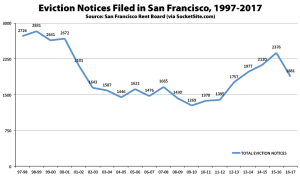The San Francisco Rent Board has published the minutes for its April 2017 meeting. It also published the agenda for its next meeting.
SocketSite Reports on Twenty Years of Aggregated Eviction Notice Data in San Francisco
SocketSite has complied twenty years of eviction notice data from the Rent Board’s annual reports to the City, showing the absolute number, as well as specifics broken down by non-fault and fault-based eviction notices.
Danger Panda v. Launiu – First District Court of Appeal Defines “Tenant” under the Rent Ordinance To Exclude Minors
“Insisting that a ‘tenant’s child may be a tenant protected under the Rent Ordinance,’ defendants direct our attention to Mosser Companies v. San Francisco Rent Stabilization & Arbitration Bd. (2015) 233 Cal.App.4th 505 (Mosser Companies) and T & A Drolapas & Sons, LP v. San Francisco Residential Rent Stabilization & Arbitration Bd. (2015) 238 Cal.App.4th 646 (Drolapas) . . . Defendants mistakenly rely on Mosser Companies and Drolapas. The primary issue in both of these cases was how to interpret statutory language in the Costa-Hawkins Act, specifically, the words ‘occupant’ and ‘possession’ in Civil Code section 1954.53(d)(2). (Mosser Companies, supra, 233 Cal.App.4th at pp. 512-513; Drolapas, supra, 238 Cal.App.4th at pp. 652-653.) The present case does not involve a proposed rent increase under the Costa-Hawkins Act. Beyond that, the question we address is not whether David is an occupant or in possession of Unit 308A. The issue here is whether David’s status as a minor precludes him from being a ‘tenant’ for all purposes under section 37.2(t) of the Rent Ordinance.”
Danger Panda, LLC is the owner of a residential property in the Mission District. Over three years ago, it begin the process of invoking the Ellis Act to terminate all residential tenancies in the building. The Ellis Act is a state law that allows property owners to “go out of the rental business” and evict their tenants, so long as they comply with local eviction control ordinances. San Francisco’s ordinance requires property owners to pay “relocation assistance”, to help displaced tenants with moving expenses and deposits for their new home.
Continue reading “Danger Panda v. Launiu – First District Court of Appeal Defines “Tenant” under the Rent Ordinance To Exclude Minors”
Second District Challenges Supreme Court on Timing of Post-Foreclosure Eviction “Three Day Notice To Quit”
“A trial court acquires jurisdiction over the parties when the plaintiff serves the defendant with the unlawful detainer summons and complaint. (Borsuk v. Appellate Division of Superior Court (2015) 242 Cal.App.4th 607, 612.) Service of the notice to quit is an element of the action that must be alleged in the complaint and proven at trial, but it does not give the court jurisdiction over the parties.”
In U.S. Financial, L.P. v. McLitus, a purchaser at a trustee’s sale following non-judicial foreclosure served a three-day notice to quit on the former owner, following the purchase but before perfecting title after the sale, and brought an unlawful detainer action to recover possession. The Superior Court for the County of San Diego awarded possession to the purchaser, but the previous owner appealed to the Appellate Division of the Superior Court, which reversed and remanded.
Continue reading “Second District Challenges Supreme Court on Timing of Post-Foreclosure Eviction “Three Day Notice To Quit””
Assembly Member Bloom Changes AB 1506 to “Two-Year Bill” – Effort to Repeal Costa-Hawkins on Hold
The Sacramento Bee reports that Assembly Member Bloom has changed AB 1506 to a two-year bill. Bloom cited the fact that “rent-control policies can be complicated” and expressed a desire for more time “to construct a policy that is responsible and addresses our specific needs today and not of decades past”.
Assembly Members Chiu, Bonta, Gonzalez Fletcher and Kalra Introduce AB 291 – A Bill Amending Landlord-Tenant Law for Heightened Protections Relating to Immigration Status
Assembly Members Chiu, Bonta, Gonzalez Fletcher and Karla have introduced AB 291 – a bill aimed at creating heightened protections for tenants relating to their immigration status. Specifically, a landlord is prohibited from harassing, intimidating or retaliating against a tenant on this basis, including by reporting their status (or the status of someone associated with them) to an enforcement agency. Landlords are also prohibited from even performing certain investigations relating to immigration status after the commencement of a tenancy, where violations create rebuttable presumptions in favor of a substantive defense to an eviction lawsuit.
The text of AB 291 as it currently exists is available here.
Los Angeles Stiffens Rules for Replacing Units Following Ellis Act Evictions
Los Angeles Times reports that Los Angeles is stiffening the affordable housing requirements for new rental units constructed after demolition following an Ellis Act withdrawal of the building from the residential rental market. While “new construction” is generally exempt from local rent control ordinances (and by Costa-Hawkins), the Ellis Act specifically exempts new units (built within five years) from these exemptions, subjecting the units to existing price controls. Cities may also allow certain density bonuses for new construction in exchange for a commitment by the developer to maintain price controls on a certain number of “affordable housing units”.
The new regulation would require developers to earmark the greater of the number of demolished units or 20% of the total number of new units to affordable housing.
San Francisco Legislative Update (2017): Revision to SF Fire Code Imposes Significant New Fire Safety Burdens on Property Owners
San Francisco recently revised its entire Fire Code to impose significant new requirements on residential property owners in the City. Cities in California must enforce the California Fire Code and they may enact their own codes that are at least as strict as California’s. The adoption of a completely new code is therefore actually somewhat ministerial. Of course, while these changes were not prompted by Oakland’s recent “Ghost Ship” warehouse fire, fire safety (and lawful residential use of unpermitted/unregulated property) has been under increasing public scrutiny lately.
Continue reading “San Francisco Legislative Update (2017): Revision to SF Fire Code Imposes Significant New Fire Safety Burdens on Property Owners”
Assembly Member Bonta Introduces AB 423 – Amendment to Prohibit Use of Ellis Act on SRO Units in Oakland
Assembly Member Bonta has introduced AB 423 – an effort to amend the Ellis Act to prohibit the withdrawing of SRO (single room occupancy) buildings in Oakland. The Ellis Act already contains such a prohibition as to any city with at least a million residents and any city that is also a county. This latter restriction is perhaps a deft reference to the City and County of San Francisco – the only such city in the state of California. The amendment would specifically reference Oakland, which has a population under half a million.
Infamous San Francisco Landlord Anne Kihagi Sent to Jail for Contempt
WeHoVille.com reports that infamous landlord Anne Kihagi has been ordered to jail for five days for violating an injunction in a case by a former tenant of one of her West Hollywood apartments, who is suing her for violating the Ellis Act. The former tenant’s lawsuit alleges that she violated the Ellis Act by re-renting the property.
The Ellis Act – which allows property owners to terminate tenancies in a building by “going out business” – actually does permit re-renting under certain circumstances (like offering the unit to the displaced tenant at the rent-controlled rental rate). However, re-rental within two years may subject the landlord to prosecution by the city and liability to the tenant.







